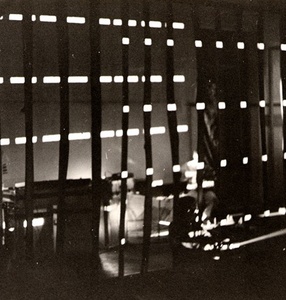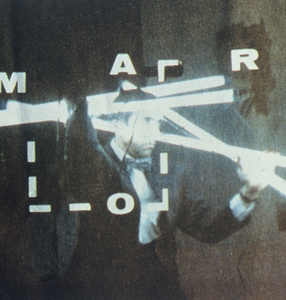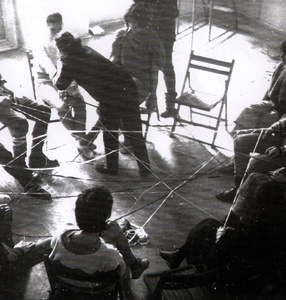From first Portuguese Performance Art to Transmission
Lecture by Verónica Metello
A lecture by Verónica Metello is one of the events as part of the series "Off-hinge / Off-centre".
2015 marks 50 years since a group of poets and musicians enacted what became to be known as the first Portuguese happening: the Concerto e Audição Pictórica at Galeria Divulgação in Lisbon.
The event marks a singular and totally forgotten history of performance art in Portugal, which very early on had deep ties to a broader international context, particularly via visual poetry and experimental music (the spanish Zaj group was created in Lisbon at the same day), via the Brazilian neo-concrete artists and poets and via Jean-Jacques Lebel, Wolf Vostell and Robert Filliou (and through them, to Fluxus ).
The singularity of the Portuguese case opens up the possibility not only to reconsider alternative histories of performance, away from the more historiographed art centers of this history (New York, Paris, Vienna), but to consider the ways in which Portuguese performance demonstrates and enacts aesthetic alternatives, particularly between performance, visual arts and poetry.
Portuguese performance art, through its first decade, also complicates and adds to the questions of performance and politics, given the direct involvement of corporeality, transgression and resistance during the harshest period of dictatorship and colonial wars. While, throughout the mid-1970s to the mid-1980s, a whole cartography of European inclusion and political conflict can be followed in post-revolutionary Portugal and in the establishing of cultural links to Europe.
The links to an international art scene shifts and transforms Portuguese performance, while also establishing its singularity. After the seminal impulse linked to visual poetry and experimental music on the 60’s, from early 1970’s performance as intervention or live acts was already taking place in art galleries in Lisbon, Valadares, Óbidos and Coimbra, and from 1974 on, performance art and body art festivals and events take place openly in the country (e.g. Perspectiva 74, Encontros Internacionais de Arte em Portugal from 1975 to 1977; Aniverário da Arte/CAPC 1974; Ciclo de Arte Moderna Portuguesa; Alternativa 0, Alternativa - Festival International de Arte viva) which have had deep impact in the practices of artists such as Orlan, Balbino Giner, Serge III, Robert Filliou and Roland Miller and Shirley Cameron , and others.
The following decades were marked by the creation of new festivals, the occupation of art galleries with performance, and the internationalization (the event Performance Portugaise at Centre Georges Pompidou in 1985 testifies the maturity of this early proposals) and creation of a new dynamics, linked to the new political situation and institutional awareness of performance art as a major genre.
Among a critical overview of their own country history at the present few young performers started looking for the history and for the body of a performative portuguese body (e.g. Vânia Rovisco) its corporeality and how to define strategies to perform bodily documentation and transmission.


